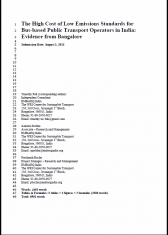
Ashwin Prabhu & Prashanth Bachu
To support the adoption of stricter fuel emissions standards, the Indian Central government has mandated that all new buses purchased by public transport authorities in select cities be compliant with the latest Bharat Stage 4 (BS-IV) emissions standard. While the BS-IV buses available in the Indian market are less-polluting than BS-III or lower buses, they have also proven to be less fuel-efficient. An analysis of the fuel efficiency data from the Bangalore Metropolitan Transport Corporation’s (BMTC) 6,472-strong bus fleet from August 2012 through January 2013 indicates that non-BS-IV buses have an average weighted fuel efficiency of 4.01 km/L, whereas BS-IV compliant buses have an average weighted fuel efficiency of 3.52 km/L. Given that BMTC estimates that its buses travel a combined 1.295 million kilometers daily, a decrease in fuel efficiency from more efficient pre-BS-IV buses to less efficient BS-IV compliant buses has significant financial implications for BMTC’s bus operations. The analysis presented in this paper shows that if BMTC were to upgrade its entire fleet to the BS-IV standard, the agency will require an additional ₹446-514 million ($7.47-8.61 million US) annually in fuel costs alone. This paper also explores the reasons for the reduction in fuel efficiency of BS-IV buses, suggests possible interventions, and identifies some potential unintended consequences.
This paper is also available here online. If you have any questions, or would like to know more about this research, contact Prashanth Bachu at prashanth.bachu@wri.org.
